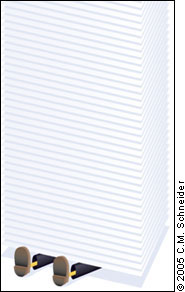
When excessive paperwork threatens the quality of patient care, it’s time for physicians to put down their pens and take a stand.
Fam Pract Manag. 2005;12(1):12

As physicians, we are inundated with paperwork in every area of medical practice. Paperwork takes time and money we desperately need for patient care. Although we moan and groan about federal and state regulations that are responsible for much of our paperwork burden, we have all succumbed to a system that produces more.
The root of the problem
Recently I went home for lunch after spending the morning at a nursing home signing papers. I bowed my head for the blessing and said, “James H. Sanders Jr., MD.” This shocked me into examining the mind-numbing forms-completion rituals that consume our lives.
Regulations, guidelines, forms and signatures are not all bad. Better documentation of what we find and do has made us better physicians and advanced medical care. It has forced us to think more clearly and methodically. Some regulations have forced us to eschew old practices that were just bad medicine. The rules on psychotropic drug use in nursing homes and the required documentation is one example. However, we have taken a good thing and created a monster.
A variety of inefficiencies in the health care system cause unnecessary paperwork, but here are some I find especially frustrating:
1. Requests for information we have already given. We are repeatedly asked for information that those asking for it already possess. In other words, the same sources want the same information over and over. They don’t want to bother looking in their own databases for the information. A careful longitudinal study has shown me that my birthday hasn’t changed in over 77 years since I was born. Why, then, am I still frequently asked to list it on forms from organizations I have dealt with for years? In a recent recertification application, a medical organization asked me to attach a copy of my certificate of attendance for each of that organization’s courses or programs I had attended for the past six years. I had already submitted this information at the conclusion of each program. When I asked if they kept a record of this, they answered that if I couldn’t find the certificates of attendance, they could check, but it would be easier if I sent in copies of the certificates. Easier for whom?
2. Requests for information we never knew or have forgotten. Because regulations and guidelines are not always clear, those who make the forms try to get all the information from us that could possibly be needed, just to be sure. A credentialing form recently asked me to list any malpractice suits that have ever been filed against me, describe what they were about, explain the outcomes and provide the court docket numbers. I have been lucky. I have been in practice 52 years and have had only two or three suits against me, and they were all thrown out of court. I don’t remember the years, and I never knew the docket numbers.
3. Requests for information mislabeled as urgent. We receive numerous requests to sign papers immediately when they simply are not urgent. In nursing homes, we receive and sign all of the orders for each patient at the beginning or end of the month. These should be reviewed with the patient’s chart and discussed with the nurse at the time of the patient’s examination. However, now we are told that we must sign them on the same date the nurse signs because that is the date they go into effect. I am frightened that I will miss an important problem in the middle of the supposedly “urgent” papers that rain on me daily.
Seeking a solution
The massive quantity of unnecessary paperwork in health care is a widespread problem that must be addressed. Hospitals and office practices are buried under mountains of paperwork. Nurses feel that paperwork is lessening the quality of care they provide. Organizations like the AMA and the AAFP, with backing from our numbers and the diplomacy and professional competency of our leaders, are making a remarkable impact on improving medical care. I think they could help with this problem. It is not a minor irritant. It is threatening the quality of patient care.